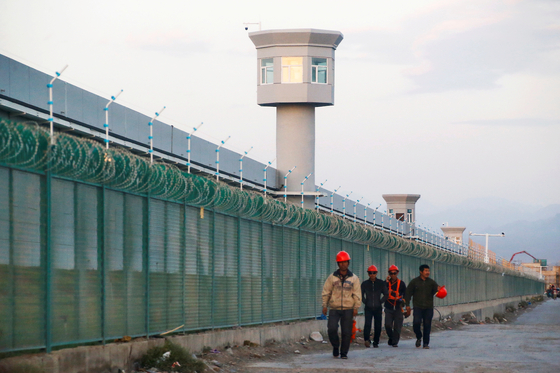
Uighur camp in Xinyuan County, Xinjiang, China. Reuters = Yonhap News
“Every night, men in suits wearing masks dragged women and raped them. I was raped by two or three men and raped three times.”
This is the testimony of Tursuwai Jiaudun, 42, a Uighur woman who was imprisoned in a prison facility in Xinyuan County, Xinjiang, China for nine months. He escaped here in 2018 and currently lives in exile in the United States, and on the 2nd (local time), he told the BBC about the painful things he had suffered.
He returned to Xinjiang in 2016 after staying in Kazakhstan for five years with a Kazakh husband. Immediately after arrival, he was interrogated by the authorities, confiscated his passport, and was arrested and detained. Life in the first camp was relatively smooth, but a month later, he had a stomach ulcer and was released. Authorities returned her husband’s passport, but not his passport. After her husband left for Kazakhstan, he was again detained.
“Their purpose is to destroy the soul of man”
Life in the second camp was hell. It is said that for a month or two after admission, they only watched the government’s propaganda program in the room with their hair cut short. Each room was assigned 14 people, and there was a bunk bed, a grate on the window, and the toilet was described as having a toilet on the floor.
One day the camp staff took him to a dark room and tortured him. “I tortured by putting a stick into the genitals and letting electricity flow,” said Giaudun. “The woman in her twenties who was dragged together was completely different after torture. I didn’t talk to anyone and I went out of my mind.”
“Some of the women who were dragged in the middle of the night did not return. Even those who returned were threatened not to tell others what happened during the torture,” he said. “I had to lie down quietly without telling anyone what happened. Their purpose is to It was to destroy everyone’s soul.”

Minority camp in Xinjiang, China. AFP=Yonhap News

The Chinese flag is visible behind the entrance to the facility. AFP=Yonhap News
“Organizing rape…Pick the money for a pretty woman”
Another Kazakh woman who had been in the camp for 18 months, Guljira Auelkan, said, “What I did was to take the women in the camp, remove their clothes, tie their hands, hand them over to the public security or Chinese men, and go out quietly.” When she left the room, she went to wash the woman,” he testified. He also said, “The men gave money to select pretty and young prisoners,” he said. “The rape was organized systematically.”
Another woman said that women were taken away during education, and that electrical torture as well as gang rape occurred. “I bitten my whole body, but I couldn’t figure out whether it was a human or an animal.” “I was forced to insert intrauterine contraceptives (IUDs), gave me an injection called’vaccine’, etc.” There were also testimonies such as “I didn’t give food if I couldn’t.”
The BBC said it was not possible to independently verify the facts of these testimonies, but it confirmed that he was in the camp through documents such as residence permits and passes.
Chinese authorities “Shinjang facility is a social education and training center”
Meanwhile, China avoided direct responses to sexual assault and torture, and told the BBC that “Xinjiang’s facility is not a camp, but a social education and training center. China protects the rights and interests of all ethnic groups equally.” He added, “We take the protection of women’s rights very seriously.”
The Uighur reeducation facility in the Uighur Autonomous Region in Xinjiang, in northwestern China, was conducted after the Uighur separatist terrorist attacks in 2014 and ordered “don’t show mercy,” according to the New York Times (NYT).
Human rights groups point out that the Chinese authorities are depriving the Uyghurs of freedom, including religion, and are implementing repressive systems, such as forcing them to conduct collective surveillance or forcing them to detain, brainwash, and infertility.
Reporter Go Seok-hyun [email protected]
